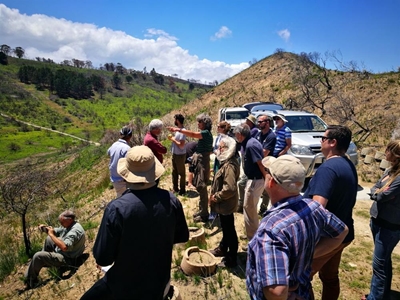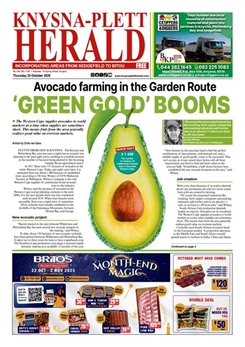KNYSNA NEWS - At a recent seminar on the state of the Southern Cape environment, hosted in the Brenton-on-Sea community hall by the Southern Cape Landowners Initiative (SCLI), the spotlight was placed on how the region was affected by fire and drought during 2017.
According to the SCLI's Cobus Meiring, landowners and conservation entities converged to discuss how to deal with invasive alien plants.
"It was agreed that invasive alien plants are no longer regarded as a mere threat to the very special biodiversity of the region, but has become a very clear and present fire danger," he said.
Meiring added that increasingly long periods of drought have been made worse by invasive alien plants impacting negatively on dwindling water resources.
"All present agreed that the sharing of knowledge and resources are vital if the intention is to have a lasting and significant effect on the impact of invasive plants in the region," he said.
The seminar, with Premier Helen Zille delivering the keynote address, drew the curtain on what was a torrid year for the Southern Cape environment.
Although headlines have been dominated by the severe wildfire that ravaged through Knysna and Plettenberg Bay in June, several other parts of the region suffered similar and devastating fates.
Not just Knysna
In February, 22 000 hectares of land burnt to a tinder in the Stilbaai/Riversdale area.
Many farmers lost their homes and infrastructure, with all thatching reed and grazing obliterated.
In the Stilbaai area, and as a result of the prevailing drought, grazing suitable for sheep and cattle has still not recovered.
Plants that did start sprouting in the spring withered away as a result of low rainfall and relentless sun in the cloudless skies.
Rainfall figures in the Southern Cape have been below normal, with many farmers near Oudsthoorn and Herold losing livestock due to the drought.
Over and above the extraordinary veld fires recorded (such as those in and around Knysna), there were literally hundreds more fires, burning down mountains, catchments and farmland.
Climate change also at play
There can be little doubt that climate change is at play.
The region is experiencing small changes in temperature, which end up having a profound effect on the prevalence, frequency and intensity of wildfire.
Instead of soft rain over extended winter and summer periods, rain now comes in episodic storms, often causing floods and failing to saturate soils and recharging groundwater supplies.
With summer rains expected, long daylight hours and a hot summer sun, environmentalists caution landowners to be on the lookout for aggressive regeneration of invasive alien plants.
Once invasive plant regrowth passes knee-height, it becomes exponentially difficult and expensive to suppress.
* The SCLI is a public platform for landowners and land managers with an interest in the eradication and control of invasive alien plants, and the promotion of water-evaporation prevention in the Garden Route. SCLI is supported by the Table Mountain Fund, a subsidiary of WWF SA.
* More info: www.scli.org.za / Cobus Meiring 083 626 7619 / cobus@naturalbridge.co.za.
'We bring you the latest Knysna, Garden Route news'
















